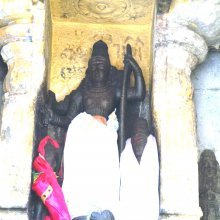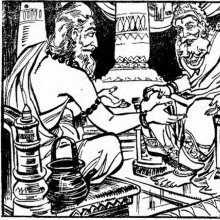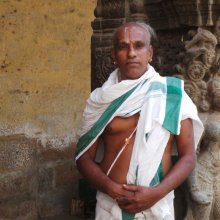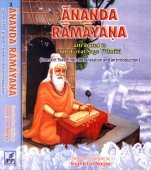Shatrughna, Śatrughna, Satrughna, Shatru-ghna: 22 definitions
Introduction:
Shatrughna means something in Hinduism, Sanskrit, Jainism, Prakrit. If you want to know the exact meaning, history, etymology or English translation of this term then check out the descriptions on this page. Add your comment or reference to a book if you want to contribute to this summary article.
The Sanskrit term Śatrughna can be transliterated into English as Satrughna or Shatrughna, using the IAST transliteration scheme (?).
Images (photo gallery)
In Hinduism
Natyashastra (theatrics and dramaturgy)
Source: archive.org: The mirror of gesture (abhinaya-darpana)One of the Hands of Famous Emperors.—For Satrughna, the Śikhara hand on the face. If these are done with the left hand on the left shoulder, it indicates those of the Lunar race.

Natyashastra (नाट्यशास्त्र, nāṭyaśāstra) refers to both the ancient Indian tradition (shastra) of performing arts, (natya—theatrics, drama, dance, music), as well as the name of a Sanskrit work dealing with these subjects. It also teaches the rules for composing Dramatic plays (nataka), construction and performance of Theater, and Poetic works (kavya).
Vaishnavism (Vaishava dharma)
Source: VedaBase: Śrīmad BhāgavatamŚatrughna had two sons, named Subāhu and Śrutasena. When Lord Bharata went to conquer all directions, He had to kill many millions of Gandharvas, who are generally pretenders. Taking all their wealth, He offered it to Lord Rāmacandra. Śatrughna also killed a Rākṣasa named Lavaṇa, who was the son of Madhu Rākṣasa. Thus He established in the great forest known as Madhuvana the town known as Mathurā. (Śrīmad Bhāgavatam IX.9.11)
Source: Pure Bhakti: Brhad BhagavatamrtamŚatrughna (शत्रुघ्न) refers to:—Śri Rāmacandra’s youngest brother and an incarnation of Aniruddha. (cf. Glossary page from Śrī Bṛhad-bhāgavatāmṛta).

Vaishnava (वैष्णव, vaiṣṇava) or vaishnavism (vaiṣṇavism) represents a tradition of Hinduism worshipping Vishnu as the supreme Lord. Similar to the Shaktism and Shaivism traditions, Vaishnavism also developed as an individual movement, famous for its exposition of the dashavatara (‘ten avatars of Vishnu’).
Purana and Itihasa (epic history)
Source: Wisdom Library: Bhagavata PuranaŚatrughna (शत्रुघ्न):—Son of Daśaratha (son of Aja). He was an incarnation who appeared to his father in the form of a son. (see Bhāgavata Purāṇa 9.10.2)
Source: archive.org: Puranic EncyclopediaŚatrughna (शत्रुघ्न).—A brother of Śrī Rāma. He and Lakṣmaṇa were the sons of Sumitrā, and Śrutakīrti was his wife. As ordered by Rāma he killed Lavaṇāsura, who lived in Madhu forest, and established there the city called Madhurāpurī. After the death of Śatrughna two sons of his lived in Madhurāpurī, and after the disappearance of the solar dynasty the city went to the Yadus. (For details see under Śrī Rāma and Hanūmān, Para 10).
Source: Cologne Digital Sanskrit Dictionaries: The Purana Index1a) Śatrughna (शत्रुघ्न).—A son of Daśaratha; bore the bow and quivers when Bharata carried the Pādukā. Father of Subāhu and Śrutasena (Sūrasena, Viṣṇu-purāṇa); killed the Rākṣasas Mādhava and Lavaṇa; seized Madhuvana and founded the city, Mathurā.*
- * Bhāgavata-purāṇa IX. 10. 3 and 44; 11. 13-14; Brahmāṇḍa-purāṇa III. 63. 185; 71. 111; Vāyu-purāṇa 88. 184-5; Viṣṇu-purāṇa I. 12. 4; IV. 4. 87. 101, 104.
1b) A son of Śvaphalka.*
- * Bhāgavata-purāṇa IX. 24. 17.
1c) A son of Bhangakāra and Narā; killed by Akrūra.*
- * Brahmāṇḍa-purāṇa III. 71. 86-8; Vāyu-purāṇa 96. 85.
1d) A son of Akrūra.*
- * Matsya-purāṇa 45. 29.
1e) A son of Aikṣvākī and Anādhṛṣṭi.*
- * Matsya-purāṇa 46. 24.
1f) A son of Gāndinī.*
- * Vāyu-purāṇa 96. 110.
1g) The great-grandson of Sātvata, killed by the Bhojas.*
- * Viṣṇu-purāṇa IV. 13. 111.
Śatrughna (शत्रुघ्न) refers to one of the four sons of Daśaratha who is the grandson of Raghu, according to the Vaṃśānucarita section of the 10th century Saurapurāṇa: one of the various Upapurāṇas depicting Śaivism.—Accordingly, [...] Raghu was the son of Dīrghabāhu. The son of Raghu was very famous from whom Daśaratha was born. Daśaratha had four sons who were religious and famous in the world. They were Rāma, Bharata, Lakṣmaṇa and Śatrughna. All of them were devoted to Lord Mahādeva.

The Purana (पुराण, purāṇas) refers to Sanskrit literature preserving ancient India’s vast cultural history, including historical legends, religious ceremonies, various arts and sciences. The eighteen mahapuranas total over 400,000 shlokas (metrical couplets) and date to at least several centuries BCE.
Kavya (poetry)
Source: Wisdom Library: Kathāsaritsāgara1) Śatrughna (शत्रुघ्न) is the name of a person mentioned in a story according to the Kathāsaritsāgara, chapter 34. Accordingly, “in a certain village there was a man named Śatrughna, and his wife was unchaste. He once saw in the evening his wife in the society of her lover, and he slew that lover of hers, when he was in the house, with his sword”.
The story of Śatrughna was narrated by Gomukha in order to demonstrate that “now and then there falls from heaven, urging on a host of virtues, a good woman that brings praise to her husband, like the pure light of the sun. But another, of evil augury, attached to strangers, not free from inordinate desires, wicked, bearing the poison of aversion, slays her husband like a female snake”.
2) Śatrughna (शत्रुघ्न) is the younger brother of Rāma, both sons of Daśaratha, the king of Ayodhyā, according to in the Kathāsaritsāgara, chapter 51. Accordingly, “... long ago king Daśaratha, the sovereign of Ayodhyā, had a son named Rāma, the elder brother of Bharata, Śatrughna and Lakṣmaṇa. He was a partial incarnation of Viṣṇu for the overthrow of Rāvaṇa, and he had a wife named Sītā, the daughter of Janaka, the lady of his life. As fate would have it, his father handed over the kingdom to Bharata, and sent Rāma to the forest with Sītā and Lakṣmaṇa”.
The story of Śatrughna was narrated by the Vidyādharī Kāñcanaprabhā to Naravāhanadatta while in a Svayambhū temple of Śiva, in order to demonstrate that “people who possess firmness endure for a long time mutual separation to which no termination is assigned”, in other words, that “heroic souls endure separation for so long a time”.
The Kathāsaritsāgara (‘ocean of streams of story’), mentioning Śatrughna, is a famous Sanskrit epic story revolving around prince Naravāhanadatta and his quest to become the emperor of the vidyādharas (celestial beings). The work is said to have been an adaptation of Guṇāḍhya’s Bṛhatkathā consisting of 100,000 verses, which in turn is part of a larger work containing 700,000 verses.

Kavya (काव्य, kavya) refers to Sanskrit poetry, a popular ancient Indian tradition of literature. There have been many Sanskrit poets over the ages, hailing from ancient India and beyond. This topic includes mahakavya, or ‘epic poetry’ and natya, or ‘dramatic poetry’.
General definition (in Hinduism)
Source: Apam Napat: Indian MythologyShatrughna is the son of King Dasharatha of Ayodhya and his youngest queen Sumitra. He is the twin-brother of Laxmana. His mother was given two half-portions of the sacrificial nectar by her elder co-wives Kausalya and Kaikeyi, and that is the reason she begat twins.
Source: WikiPedia: Hinduism1) Shatrughna was the youngest brother of Lord Rama in the Hindu epic Ramayana . He is the twin brother of Lakshmana.
Shatrughna was born to the virtuous king of Ayodhya, Dasaratha, and his third wife, Queen Sumitra. Dasharatha's other two wives, Kaushalya and Kaikeyi, had sons as well. Kaushalya had Rama and Kaikeyi had Bharat who were Shatrughna's half-brothers. Shatrughna also had a blood-brother called Lakshmana. Shatrughna's name means "destroyer of enemies". Shatrughna was married to Shrutakeerti, the daughter of King Kusadhbojan and his wife. Shrutakeerti was the cousin of Sita, daughter of King Janaka. He is supposed to be the reincarnation of Vishnu's sacred conch.Shatrughna has two sons-Chitraketu and Subahu.
2) Shatrughna (शत्रुघ्न): One of Dasharatha's four sons, King of Madhu.
etymology: Shatrughna (Sanskrit: शत्रुघ्न Śatrughna, Thai: พระสัตรุด, Burmese: Tharugana, Tamil: Shatrughana, Malay: Citradan)
Source: Vaniquotes: HinduismŚatrughna is the incarnation of Aniruddha.
In Jainism
General definition (in Jainism)
Source: archive.org: TrisastisalakapurusacaritraŚatrughna (शत्रुघ्न) is son of Suprabhā and Daśaratha, according to the Jain Ramayana and chapter 7.4 [Rāma and Lakṣmaṇa] of Hemacandra’s 11th century Triṣaṣṭiśalākāpuruṣacaritra: an ancient Sanskrit epic poem narrating the history and legends of sixty-three illustrious persons in Jainism.—Accordingly, “There one day Kaikeyī bore a son indicated by an auspicious dream, the ornament of Bharata, named Bharata. Suprabhā also bore a son, a joy to the family, named Śatrughna, possessing power of arm to kill enemies. Bharata and Śatrughna, inseparable day and night from affection, looked like another Baladeva and Vāsudeva. King Daśaratha looked with his four sons like Mt. Meru with its mountains in the shape of elephants’ tusks”.

Jainism is an Indian religion of Dharma whose doctrine revolves around harmlessness (ahimsa) towards every living being. The two major branches (Digambara and Svetambara) of Jainism stimulate self-control (or, shramana, ‘self-reliance’) and spiritual development through a path of peace for the soul to progess to the ultimate goal.
Languages of India and abroad
Sanskrit dictionary
Source: DDSA: The practical Sanskrit-English dictionaryŚatrughna (शत्रुघ्न).—'destroyer of enemies', an epithet of a brother of Rāma and twin brother of Lakṣmaṇa, being a son of Sumitrā. He killed the demon Lavaṇa and colonized Mathurā. He had two sons named Subāhu and Bahusruta; see R.15.
Derivable forms: śatrughnaḥ (शत्रुघ्नः).
Śatrughna is a Sanskrit compound consisting of the terms śatru and ghna (घ्न).
Source: Cologne Digital Sanskrit Dictionaries: Shabda-Sagara Sanskrit-English DictionaryŚatrughna (शत्रुघ्न).—mfn.
(-ghnaḥ-ghnī-ghnaṃ) Killing a foe. m.
(-ghnaḥ) The second brother of Ramachandra, the son of Dasaratha by Sumitra, and uterine brother of Lakshmana. He slew Lavana, the demon and colonized Mathura. E. śatru an enemy, and ghna destroyer.
Source: Cologne Digital Sanskrit Dictionaries: Benfey Sanskrit-English DictionaryŚatrughna (शत्रुघ्न).—[śatru-ghna], I. adj. Killing a foe. Ii. m. a proper name, utt. Rāmac. 31, 9.
Source: Cologne Digital Sanskrit Dictionaries: Cappeller Sanskrit-English DictionaryŚatrughna (शत्रुघ्न).—[adjective] slaying foes; [masculine] a man’s name.
Source: Cologne Digital Sanskrit Dictionaries: Aufrecht Catalogus CatalogorumŚatrughna (शत्रुघ्न) as mentioned in Aufrecht’s Catalogus Catalogorum:—Saṃdhyābhāṣya.
Source: Cologne Digital Sanskrit Dictionaries: Monier-Williams Sanskrit-English Dictionary1) Śatrughna (शत्रुघ्न):—[=śatru-ghna] [from śatru] mfn. foe-killing, destroying enemies, [Pañcarātra]
2) [v.s. ...] m. Name of one of Rāma-candra’s brothers (he was son of Sumitrā and twin brother of Lakṣmaṇa, and was the chosen companion of Bharata, son of Kaikeyī, as L° was of Rāma, son of Kauśalyā), [Rāmāyaṇa; Raghuvaṃśa] etc. (cf. [Indian Wisdom, by Sir M. Monier-Williams 345; 503])
3) [v.s. ...] of a son of Śva-phalka, [Harivaṃśa]
4) [v.s. ...] of a son of Deva-śravas, [ib.]
5) [=śatru-ghna] [from śatru] n. a weapon, [cf. Lexicographers, esp. such as amarasiṃha, halāyudha, hemacandra, etc.]
Source: Cologne Digital Sanskrit Dictionaries: Yates Sanskrit-English DictionaryŚatrughna (शत्रुघ्न):—[śatru-ghna] (ghnaḥ) a. Idem. 1. m. The 2nd brother of Rāṃchandra.
[Sanskrit to German]
Sanskrit, also spelled संस्कृतम् (saṃskṛtam), is an ancient language of India commonly seen as the grandmother of the Indo-European language family (even English!). Closely allied with Prakrit and Pali, Sanskrit is more exhaustive in both grammar and terms and has the most extensive collection of literature in the world, greatly surpassing its sister-languages Greek and Latin.
Kannada-English dictionary
Source: Alar: Kannada-English corpusŚatrughna (ಶತ್ರುಘ್ನ):—
1) [noun] he who destroys his enemies.
2) [noun] name of a younger brother of Rāma, in Rāmāyaṇa.
Kannada is a Dravidian language (as opposed to the Indo-European language family) mainly spoken in the southwestern region of India.
Nepali dictionary
Source: unoes: Nepali-English DictionaryŚatrughna (शत्रुघ्न):—n. Mythol. name of one of the brothers of Ram;
Nepali is the primary language of the Nepalese people counting almost 20 million native speakers. The country of Nepal is situated in the Himalaya mountain range to the north of India.
See also (Relevant definitions)
Partial matches: Ghna, Shatru.
Starts with: Shatrughna sharman, Shatrughnajanani.
Ends with: Nityashatrughna.
Full-text (+75): Shatrughnajanani, Lavanantaka, Shatruhan, Sumitra, Saumitri, Shrutakirti, Shatruha, Madhuvana, Shatrumardana, Lakshmana, Shrutasena, Rama, Shatrughatin, Nityashatrughna, Catturukkanan, Shatrughni, Ashvapati, Mitra, Shrutkirti, Mathura.
Relevant text
Search found 46 books and stories containing Shatrughna, Śatrughna, Satrughna, Shatru-ghna, Śatru-ghna, Satru-ghna; (plurals include: Shatrughnas, Śatrughnas, Satrughnas, ghnas). You can also click to the full overview containing English textual excerpts. Below are direct links for the most relevant articles:
Thirty minor Upanishads (by K. Narayanasvami Aiyar)
The Padma Purana (by N.A. Deshpande)
Chapter 53 - Rāma Frees the Bound Heroes < [Section 5 - Pātāla-Khaṇḍa (Section on the Nether World)]
Chapter 29 - King Subāhu Surrenders to Śatrughna < [Section 5 - Pātāla-Khaṇḍa (Section on the Nether World)]
Chapter 45 - Śrī Rāma Appears on the Battlefield < [Section 5 - Pātāla-Khaṇḍa (Section on the Nether World)]
Insight into the Aswamedha and payasa < [January – March, 2001]
The Mother < [April 1952]
The Role of Bharata in The Ramayana < [October 1967]
Ramayana of Valmiki (by Hari Prasad Shastri)
Chapter 68 - Shatrughna encounters Lavana < [Book 7 - Uttara-kanda]
Chapter 78 - The hunchback, Manthara, incurs Prince Shatrughna’s displeasure < [Book 2 - Ayodhya-kanda]
Chapter 63 - The Installation of Shatrughna < [Book 7 - Uttara-kanda]
Harivamsha Purana (by Manmatha Nath Dutt)
Chapter 54 - The Birth of the Daityas < [Book 1 - Harivamsa Parva]
Chapter 34 - Krausthu’s Family < [Book 1 - Harivamsa Parva]
Chapter 94 - The Yadavas Arrive at the City of Asuras as Actors < [Book 2 - Vishnu Parva]
Trishashti Shalaka Purusha Caritra (by Helen M. Johnson)
Part 7: Śatrughna’s capture of Mathurā < [Chapter VIII - The abandonment of Sītā]
Part 10: Birth of Bharata and Śatrughna < [Chapter IV - The, birth, marriage, and retreat to the forest of Rāma and Lakṣmaṇa]
Part 9: Story of the seven ascetic-brothers < [Chapter VIII - The abandonment of Sītā]
Related products





